Iran Sentences 26 Baha'is To A Ttoal Of 85 Years In Prison

Iran has sentenced 26 followers of the Baha'i faith from 2-5 year prison terms each as well as barring them from leaving the country for some years.

Iran has sentenced 26 followers of the Baha'i faith from 2-5 year prison terms each as well as barring them from leaving the country for some years.
According to information obtained by Radio Farda, these 26 people, all of whom are residents of the city of Shiraz in the southwestern province of Fars, are charged with "conspiracy to disrupt internal and external security."
The verdicts was issued on June 8 by a branch of the city’s Revolutionary Court, and pertains to the arrests of numerous Baha'is in Shiraz in 2016.
The 1979 constitution of the Islamic Republic recognizes only Islam, Christianity, Judaism and Zoroastrianism. Baha'ism − established as a new religion in Iran in 1863 by Baha'ullah, who claimed to be a prophet following Jesus and Mohammad − has always been deemed heretical by the Shia establishment and subject to intermittent bouts of political persecution.
Supreme Leader Ali Khamenei has on several occasions called the Baha'i faith a cult and in a religious fatwa in 2018 forbade contact, including business dealings, with followers of the faith.
Baha'is, who number around 300,000 in Iran, say their rights are systematically violated, that they are often harassed, forced to leave their homes and businesses, and are deprived of government job and university education. There are Baha’i communities in many countries worldwide but there is no reliable figure about the total number of followers.
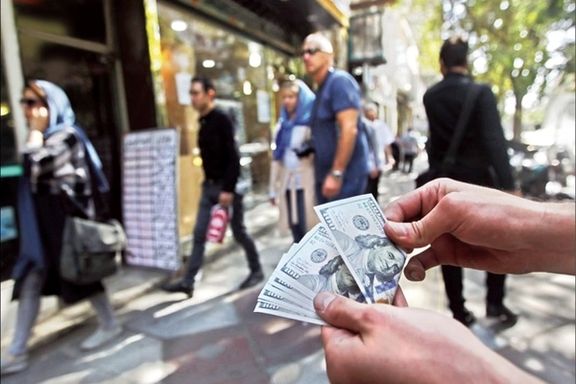
While Iran’s currency is losing value every day, Iran’s Economic Security Police has arrested more than 30 people over allegations of market manipulation.
Deputy Chief of the Economic Security Police, Brigadier General Sohrab Bahrami, announced Sunday that several “other such criminals” have been identified and will be dealt with soon.
Police will deal with these people for "disrupting the economic system," he said, and claimed that these people create false demand for the US dollar in the Iranian market, hence disrupting the market stability.
The Islamic Republic facing continuing economic crisis in the past 4 years often arrests dealers and businessman accusing them of rigging demand or supply, in an effort to show the public that it is proactive.
Last week, the police announced the detention of 16 so-called criminals in coordination with the judiciary and the Central Bank.
Iran’s rial is hitting new lows against the US dollar daily amid runaway inflation and economic chaos, with one US dollar surpassing 333,000 rials on Sunday.
The drop comes as the last rays of hope for reviving the 2015 nuclear deal between Tehran and world powers are fading away, with multilateral talks in Vienna paused since March.
Food prices have soared since early May when the government lifted import subsidies for essential goods to save foreign currency, and anti-government protests have become a regular scene in several cities.

The US government’s Rewards for Justice program has offered up to $15 million for information that can disrupt Iran’s IRGC and its Quds Force financial networks.
The program announced the reward on Sunday [June 12] in a tweet emphasizing that “IRGC-QF conducts its terrorist activities around the globe via proxies, and uses various financial means to bypass U.S. sanctions. Have relevant info? SEND US A TIP!”
The announcement can be seen additional pressure on the Islamic Republic as it continues to support militant groups across the Middle East and beyond, after negotiations to revive the 2015 nuclear agreement known as the HCPOA came to a halt in March.
Reports indicated that Tehran insisted on removing the IRGC from the US list of Foreign Terrorist Organization (FTO). President Joe Biden’s administration has so far not accepted the Iranian demand, as dozens of American lawmakers have also told the White House not to make such concessions.
The Quds Force is a branch of the Revolutionary Guard that conducts operations beyond Iran’s borders. Its long-time commander and the architect of its expansion, Qasem Soleimani, was killed by a US drone attack in Iraq in January 2020. Top Iranian officials have vowed revenge, with reported threats against former Trump officials, such as Secretary of State Mike Pompeo.
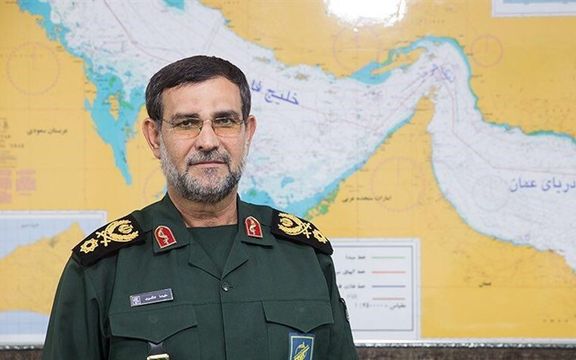
Whoever allows Israel to establish presence in the Persian Gulf will encounter security problems, Iran's IRGC Navy commander warned neighbors on Saturday.
Arab countries such the United Arab Emirates and Bahrain that established full relations with Israel in 2020, have expanded ties, including close intelligence and security cooperation.
Admiral Alireza Tangsiri said, “Today there is satisfactory security with cooperation among neighboring countries in the geographical area of the Persian Gulf,” but if for whatever reason someone allows “the number one enemy” into the region, it will create “chaos and instability” both for itself and for the region.
Israel and Persian Gulf Arab states have long been concerned over Iran’s nuclear program and adventurist regional policies, as well as its rapid expansion of missile technology. They supported former US president Donald Trump’s withdrawal from the Obama-era nuclear agreement and imposition of tough sanctions on Tehran.
But President Joe Biden’s entrance into the scene in 2021 changed the close coordination that existed during the Trump administration, especially between the US and Saudi Arabia, the main Arab power in the region souring.
Biden announced early on that he wanted to revive the nuclear deal with Iran known as the JCPOA and reduced support for Saudi Arabia in the Yemen war, a proxy war with Iran.
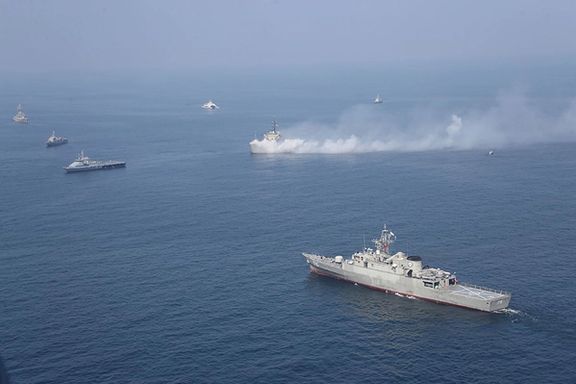
Tangisir’s speech on Saturday was not the first instance of warning issued to Arab states in the region. He had also made a similar statement in April, but since then Israel’s cooperation expanded with the Persian Gulf Arab states.
News also emerged on June 9, that a group of US lawmakers calling themselves supporters of the Abraham Accords, or the deal to establish ties between Israel and Arab countries, announced an initiative to create a united fron against Iran with Americans playing a central role.
The legislation proposes that the Pentagon works with Israel to integrate air defenses of six Gulf Cooperation Council countries of Bahrain, Kuwait, Oman, Qatar, Saudi Arabia, and the United Arab Emirates with Egypt, Jordan, and Iraq with the aim of thwarting threats from Iran and Iranian backed-militias across the region.
Reports also speak of secret talks to establish relations between Israel and Saudi Arabia, which has so far remained cool to the idea.
These efforts in effect would create what observers have long dubbed as an anti-Iran NATO and put further pressure on Tehran which remains largely isolated and under the pressure of US economic sanctions.
A year-long diplomatic process between Iran and world powers to revive the JCPOA and lift the sanctions stalled in March, as Tehran insisted on removing the IRGC from the US list of terrorist organizations.
In recent days other Iranian officials have also made statements emphasizing Iran’s military power and readiness to defend the Islamic Republic against threats.
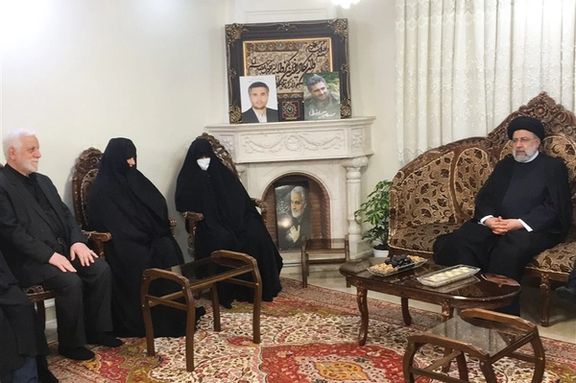
The Iranian president has paid a visit to the family of Colonel Hassan Sayyad-Khodaei, a commander of Iran’s Revolutionary Guard's Quds Force who was assassinated last month.
In his visit to the Sayyad-Khodaeis on Sunday, Ebrahim Raisi said that his assassination by the opponents of the Islamic Republic in Tehran near his home, instead of confronting him on the battlefield, is a sign of their despair and a victory for the country.
Despite Raisi’s assertion of victory, the assassination was seen as an intelligence and security failure by the government that allowed the killing of a secretive officer in broad daylight in the capital.
Sayyad-Khodaei was the acting commander of the elite Quds Unit 840, who was shot dead behind the wheel of his car on May 22 by two gunmen who fled the scene on a motorbike.
A European security source told Iran International in late May that Sayyad-Khodaei was in charge of planning terror operations outside Iran, including attacks in India, Thailand, Cyprus and Georgia. Suspicions for his assassination fell on Israel and according to some reports, Israeli officials told the United States that they had targeted Sayyad-Khodaei.
After his assassination, Iran International’s sources in Iran reported that another Quds Force unit 840 commander died under suspicious circumstances in Karaj, west of Tehran, on May 30. Colonel Ali Esmailzadeh died when he fell from the roof of his home.
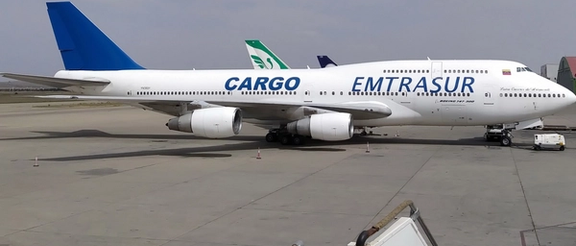
A Boeing 747 operating for the cargo division of Venezuelan national carrier Conviasa is stranded in Argentina for its links with Iran’s IRGC Quds Force.
Aníbal Fernández, Argentina’s security minister tweeted on Saturday that “The Government immobilized in Ezeiza [Airport in Buenos Aires] a Venezuelan plane sanctioned by the United States and withheld the passport of five Iranian crew members.” The tweet came after a local website leaked the news about the plane.
The plane was previously operating for Iran’s Mahan Airlines, sanctioned by the United States for its links to Tehran’s extraterritorial intelligence and secret ops outfit, the Quds (Qods) Force since 2008. The specific aircraft which belonged to French airlines since it entered service in 1986, was sold to Mahan Airlines in 2007 and apparently was later sanctioned by the United States.
Early in 2022, Venezuela’s Conviasa decided to set up a cargo division that came to be called Emtrasur Cargo and its first plane was the Boeing 747-300M bought or leased from Mahan airlines and christened ‘Louisa Caceres Arismendi.’ What is more interesting is that its next two planes were also supposed to be Mahan Airlines aircraft.
With close military and economic cooperation between Caracas and Tehran, the newly established cargo company could to be a joint venture.
However, a Mahan spokesman in Theran denied that the plane had any links with the company and said that it was "sold to Venezuela about a year ago."
The Boeing 747 flew from Mexico to Argentina on June 6, carrying automotive parts, but according to Argentinian media, someone knew something and decided to inspect the aircraft carefully, Aviacioline reported on June 11.
Although it turned out that there was no illegal cargo on board and the auto parts shipment were delivered to its recipient in Argentina, authorities became more suspicious that there were five Iranians and at least a dozen Venezuelans on board, with the Iranians not appearing in the passenger manifest. As a result, the passports of the Iranians were seized and all the passengers are reported to be in a hotel.
According to the same local sources, Argentina suspects that the Iranians are members of the Quds Force but are allowed to leave the country on regular scheduled flights.
But the fate of the plane is another story. No fuel company is willing to provide service to the aircraft for fear of third-party US sanctions. It tried to leave Argentina for Uruguay to get fuel, but had to turn back when permission was denied, according to Spanish-language news website Infobae.
The news about the aircraft emerged after an Argentinian opposition lawmaker, Gerardo Milman, submitted a request for information, citing “the enigmatic behavior of the flight, the confusing ownership of the aircraft and the composition of the crew.” On point that Milman has highlighted is that the Boeing 747 first flew to Cordoba from Mexico, ostensibly because of fog in Buenos Aires and a few hours later flew to its final destination, while its transponder was off.
It is not clear if the fog was the real reason why the plane diverted to Cordoba, and if its crew left the plane or not.
What is also not clear is who provided information to Argentina to carefully inspect the plane and its passengers. Apparently the Venezuelan cargo operation and this particular aircraft were under observation for some time.